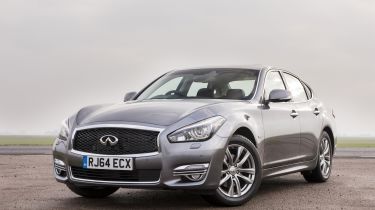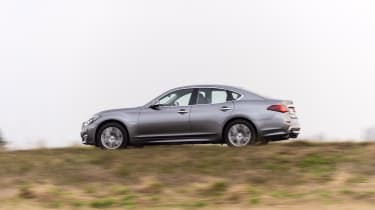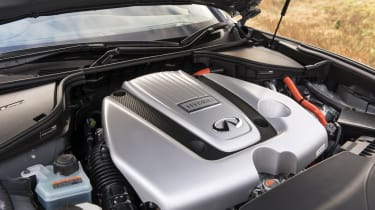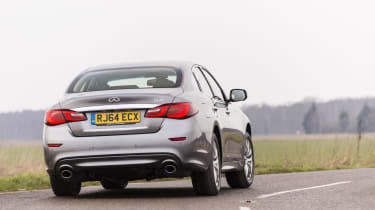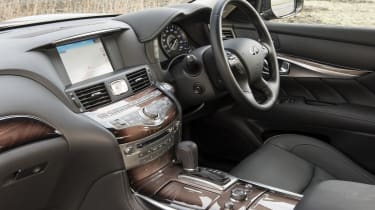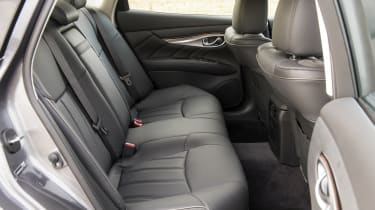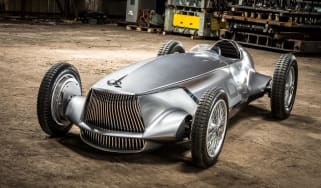Infiniti Q70 Hybrid (2013-2018)
"The Infiniti Q70 Hybrid is fast and comfy, but rivals are more cost-effective"
Pros
- Cheaper to run than petrol
- Distinctive looks
- Very fast
Cons
- Small boot
- Rivals cheaper to run
- Dull driving experience
The Infiniti Q70 is a large executive saloon that competes directly with the BMW 5 Series saloon and Mercedes E-Class saloon. There are three separate engines available – a 2.2-litre diesel engine, a powerful 3.7-litre petrol engine, and the hybrid version.
All models are very well equipped, with a touchscreen infotainment system as standard that includes sat nav and Bluetooth music streaming. Dual-zone air-conditioning, a seven-speed automatic gearbox and a reversing camera are all standard.
With power provided by a 302bhp 3.5-litre V6 petrol engine working in conjunction with a 67bhp electric motor, the Q70 Hybrid isn’t short of power, either. It manages the 0-62mph sprint in just 5.3 seconds on its way to an electronically limited top speed of 155mph.
It’s tempting to label the Q70 Hybrid a sports saloon but sadly when it comes to having fun behind the wheel, it doesn’t engage and entertain in the same way as a BMW 5 Series. The biggest shortcoming is the steering, which feels vague and imprecise compared to its German rivals. The hybrid is further hamstrung by the weight of the batteries for its hybrid power system, which adds to the car’s bulky feeling.
The Q70 Hybrid is more at home at a relaxing cruise than a spirited backroad drive, it’s very quiet at speed, and the suspension is soft for a well-cushioned motorway ride, but the big wheels and low-profile tyres are prone to crashing into potholes and amplifying bumps at slow, urban speeds. Ironically, it’s around town that the Infiniti is at its quietest – it can travel at slow speeds on electric power alone.
It’s during this kind of journey that the Q70 Hybrid begins to make sense because the less the petrol engine is called upon, the lower your fuel consumption will be. Official figures claim an overall 45.6mpg, which is a far lower figure than the slower 3.7-litre Sport Tech model. The hybrid is also far less of a financial burden for company car users, fitting into the 31% Benefit-in-Kind bracket compared to the pure petrol car’s 37% rating.
More reviews
In-depth reviews
If fuel economy is your most pressing concern, the far less expensive 2.2-litre diesel will suit you better; a possible 58.9mpg is claimed, while the company car tax rate is lower, too. Ultimately, though, no version of the Q70 does enough to recommend itself against the BMW 5 Series or Mercedes E-Class, both of which offer very economical plug-in hybrid models with far lower company car tax rates, for a similar asking price
MPG, running costs & CO2
As far as the buyer is concerned, the core appeal of any hybrid car comes with reduced running costs compared to conventional petrol or diesel models. The Infiniti Q70 Hybrid, though, doesn’t make the most clear-cut case for itself.
If you compare the hybrid to the 3.7-litre petrol model, it has a big claimed economy advantage – 45.6mpg compared to 26.2mpg. It also has a lower CO2-based Benefit-in-Kind rating, which is used to calculate company car tax. The hybrid’s 149g/km CO2 emissions place it in the 28% bracket, compared to 37% for the 3.7-litre petrol – so far lower company car tax bills can be expected.
That hybrid’s fuel economy figure will be hard to achieve unless you make frequent use of the hybrid’s electric power mode. Low-speed driving, such as that in urban stop-start traffic is the situation in which the petrol engine is least likely to be called upon, and it is there you’re likely to make the biggest fuel savings. In faster traffic and on motorways, though, you can expect your fuel economy to be far worse; little better, in fact, than any other 300bhp petrol car.
For frequent motorway trips, the far cheaper Q70 2.2-litre diesel makes more sense – its 58.9mpg fuel consumption is more appealing to private buyers, while its 26% BiK makes it more attractive to company car buyers, too.
In other respects, the hybrid will have similar running costs to other Q70 models – a typical service bill is likely to be comparable to those of rival BMW or Mercedes models. Road tax costs £450 on the hybrid, compared to £140 per year for the diesel, providing its price doesn’t stray above £40,000 once options have been chosen.
Engines, drive & performance
When it comes to addressing the needs of the enthusiastic driver, the Q70 Hybrid has a strong card to play when it comes to acceleration. Managing 0-62mph in just 5.3 seconds, it’s very fast indeed, with the electric motor contributing to a very swift getaway from a standing start. Where it’s safe and legal to do so, you can keep accelerating to an electronically-limited top speed of 155mph.
Sadly, the Q70’s sports-saloon qualifications don’t go much further than that. It’s not a car that rewards its driver through the corners – the steering is too light and lacking in feel to make you feel part of the action. The Q70 always feels heavy too, and the hybrid does even more so thanks to its heavy hybrid battery pack mounted beneath the rear seats.
The Q70 Hybrid is far better suited to high speed cruising, where it rides smoothly and occupants suffer very little interior noise, or trundling gently around town, which can be achieved in near silence. Indeed, if you use only modest acceleration away from the lights, you won’t trigger the petrol engine until you reach jogging pace, so urban driving is very relaxing.
Interior & comfort
It could be easily argued that the Q70 is more appealing to passengers than to its driver. While the decor and design may not be to all tastes, every Q70 has a very lavish, well-appointed interior. Quality is generally very impressive, although it’s a little disappointing to find switches shared by models from Nissan, the parent company of Infiniti. Few will complain about comfort, though; the seats are plushly upholstered and engine and wind noise levels are muted.
The Q70’s suspension is softly sprung, and this helps cushion the ride when cruising at motorway speeds. The 18-inch wheels fitted to hybrid models aren’t as big as the 20-inch wheels that Sport and Sport Tech diesel and 3.7-litre petrol models have, and aren’t quite as prone to crashing through potholes, but occupants may still feel distinct tremors through the bodywork when the hybrid passes over bumps and road imperfections.
The hybrid can be chosen in Premium or Premium tech versions. The latter adds adaptive cruise control, a Bose premium sound system and around-view monitor to assist when manoeuvring at low speeds. This is on top of the LED headlamps, rear-view camera, climate control and sat-nav that all models feature as standard equipment.
The dashboard doesn’t look as modern as those of its closest rivals, though. There’s a confusing array of buttons for the infotainment and climate control systems, while the graphics on both the instruments and central control screen look a little dated.
Practicality & boot space
Q70 passengers actually get a better deal than the driver when it comes to interior space, too. The driving position seems rather high, and the electric seat adjustment isn’t the most user-friendly. The front passenger seat is a bit cosy - the bulky dashboard means it doesn’t have the open, airy feel of some rivals, but there’s enough knee and legroom to stretch out in comfort.
Those in the rear have little cause for complaint, either, with plenty of head and legroom for all but the tallest, and plenty of room for average-size adults to sit three-abreast on the deeply-cushioned rear bench seat. The only criticism is that a hefty transmission tunnel running the length of the car means the middle-seat occupant will struggle for a place to put their feet.
The Q70 Hybrid’s biggest practicality disappointment is found when you open the boot. Here, you’ll find a find a luggage compartment that has shrunk by 100 litres from the regular Q70’s 450 to just 350 litres. This is all down to the battery pack for the hybrid system, which is located behind the rear seat. Although rival hybrid models also suffer from reduced bootspace, the BMW 530e Plug-In hybrid still boasts a 410-litre boot, while the Mercedes E-Class 350h hybrid offers 400 litres.
Reliability & safety
Part of Infiniti’s brand appeal is the strong record it has built for customer service. However, too few Infiniti owners participated in our 2017 Driver Power survey for the company – or its cars - to give us a clear indication of how satisfied Infiniti Q70 drivers are with their choice.
There doesn’t seem any doubts over the Q70’s build quality, though. The materials used inside and out feel robust and everything is well assembled – it only fails to match German rivals in the tactility of some of its interior surfaces.
Infiniti’s UK warranty lasts for three years/60,000 miles, which is less generous than the three-year/unlimited mileage policy provided by Mercedes and BMW, but on a par with Volkswagen and Audi.
The Infiniti Q70 hasn’t been put through its crash-safety paces by independent experts EuroNCAP yet, and it’s unlikely it will before the next-generation version becomes available. However, Hybrid Premium Tech models have autonomous emergency braking and active cruise control as part of a standard ‘Safety Shield Pack’ that also includes blind spot warning and lane departure assist. Unfortunately, the package can’t be added to regular Hybrid Premium models.
Price, value for money & options
The large executive saloon market isn’t short of talent, and the Q70 is up against the Mercedes E-Class, BMW 5 Series and Audi A6 for a share of sales. Against the strengths of these cars, the Infiniti Q70 simply isn’t a better car in any regard than any of its German rivals. The Japanese Lexus GS 450h is also a rival, but is considerably more expensive, while the cheaper GS300h version is nowhere near as fast.
The most compelling reasons to consider a Q70 are its looks and leftfield image compared to ‘the usual suspects’, and the 2.2-litre diesel is the most cost-effective model for most buyers. You can choose this in either Premium, Premium Tech, Sport or Sport Tech trim levels, while the hybrid can only be chosen in the two Premium trims. The diesel is significantly cheaper to buy, and its 58.9mpg fuel economy is well suited to those who make frequent long-distance journeys – a situation where the Q70 is most at ease.
The appeal of the hybrid is rather more specific – a company car buyer fixed on choosing a Q70 3.7-litre V6 will be much better off with the lower 28% Benefit-in-Kind (BiK) tax ratings of the hybrid – and it’s actually a faster car to boot. In comparison, the BMW 530e iPerformance plug-in hybrid offers a far lower BiK rating of just 9%, while its straight-line performance doesn’t fall far short of the Q70 Hybrid.

